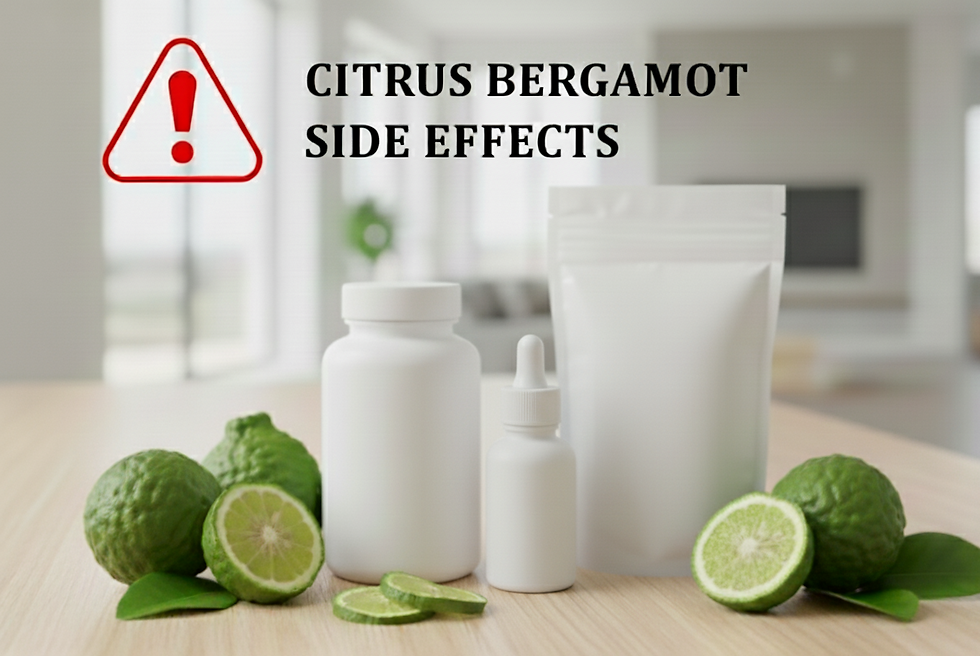Citrus Bergamot and Ginger for Metabolic & Digestive Health
- Herbs around us
- Nov 4, 2025
- 3 min read
Updated: Nov 12, 2025
Introduction
Maintaining balanced metabolism and healthy digestion is essential for overall vitality. Among natural options, Citrus Bergamot and Ginger stand out for their complementary actions on cholesterol, inflammation, and gut function.
While Citrus Bergamot supplements are valued for their lipid-lowering polyphenols, Ginger root offers well-documented digestive and anti-inflammatory benefits. When used together, they form a botanical pair that supports both cardiovascular and gastrointestinal health in a natural, evidence-based way.

What Is Citrus Bergamot?
Citrus Bergamot (Citrus bergamia) is a Mediterranean fruit rich in flavonoids such as brutieridin and melitidin—compounds shown to inhibit cholesterol synthesis enzymes and improve lipid metabolism.
Clinical research suggests that Bergamot extract can:
Lower LDL cholesterol and triglycerides
Increase HDL cholesterol
Improve liver function related to fat processing
Reduce oxidative stress within the cardiovascular system
Thanks to these benefits, Citrus Bergamot capsules are often featured in natural formulas for heart and metabolic wellness.
What Is Ginger root?
Ginger (Zingiber officinale) has been used for centuries in both culinary and medicinal traditions. Its bioactive compounds, gingerols and shogaols, promote digestion, reduce nausea, and act as potent antioxidants.
Scientific studies show that Ginger may:
Improve gastric motility and nutrient absorption
Reduce inflammatory markers such as TNF-α and IL-6
Support healthy blood sugar and lipid levels
Ease occasional bloating and discomfort
Its ability to enhance digestion and circulation makes it a natural partner for bergamot’s metabolic benefits.
How Citrus Bergamot and Ginger Work Together
1. Enhancing Lipid Metabolism
Bergamot’s flavonoids influence cholesterol synthesis in the liver, while Ginger extract increases bile secretion, assisting fat breakdown and excretion. Together, they help maintain healthy lipid profiles and reduce fatty accumulation in the liver.
2. Reducing Inflammation and Oxidative Stress
Both botanicals provide antioxidant protection. Ginger’s gingerols and Bergamot polyphenols neutralize free radicals, protecting blood vessels from oxidative damage. This synergy supports cardiovascular resilience and healthy circulation.
3. Supporting Digestive Efficiency
Ginger powder stimulates digestive enzymes and calms the stomach, while the mild bitterness of Bergamot encourages bile flow. Combined, they improve nutrient absorption and support post-meal comfort, particularly after heavy or fatty foods.
4. Stabilizing Blood Sugar and Energy
Emerging research shows that Citrus fruit polyphenols aid glucose control, while Ginger enhances insulin sensitivity. Together, they support steady energy levels and help reduce metabolic fluctuations caused by stress or poor diet.
Scientific Perspective
Clinical trials confirm that Bergamot extract can lower LDL cholesterol by up to 25% without affecting liver safety markers [1].
Ginger supplementation (2 g/day) improved triglyceride and fasting glucose levels in adults with metabolic syndrome [2].
Herbal combinations that include polyphenols and thermogenic compounds often show additive effects on lipid and glucose metabolism [3].
These results support the traditional pairing of warming, circulatory herbs (like Ginger) with antioxidant, lipid-balancing fruits (like Bergamot).
Usage and Forms
Citrus Bergamot capsules: Typically 500–1000 mg of standardized extract daily.
Ginger extract: Equivalent to 1–2 g dried root per day, divided with meals.
They can be taken separately or as part of combined Citrus Bergamot supplements designed for metabolic and digestive support.
Consistency matters—results often appear after 4–8 weeks of regular use.
Safety and Precautions
Both ingredients are generally well tolerated.
Ginger root may cause mild warmth or reflux in sensitive individuals.
Bergamot extract should be sourced from reputable, standardized sources. Those on blood-thinning or cholesterol-lowering medications should consult a healthcare provider before supplementation.
Summary
Citrus Bergamot with Ginger brings together the best of two traditions: Mediterranean heart support and Asian digestive balance. Their combined actions may:
Promote healthy cholesterol and triglyceride levels
Support comfortable digestion and nutrient absorption
Reduce inflammation and oxidative stress
Enhance metabolic efficiency and sustained energy
As part of a balanced diet and lifestyle, this natural duo offers gentle yet powerful support for metabolic and digestive wellness.
FAQ
1. Can I take Citrus Bergamot, Ginger together?
Yes. They complement each other—Bergamot supports lipid balance, while Ginger enhances digestion and circulation.
2. When is the best time to take them?
Take with meals, preferably breakfast or lunch, to support digestion and absorption.
3. Are there side effects?
Both are well tolerated. Ginger may cause mild warmth or reflux; Bergamot is generally gentle when used in recommended doses.
4. Can they replace cholesterol medications?
No. These herbs may complement medical treatment but should not replace prescribed medication without professional advice.
References
Toth, P. P., et al. (2020). Effects of bergamot polyphenolic fraction on lipid profiles in humans.
Mahluji, S., et al. (2013). Effects of ginger supplementation on glycemic control and lipid profiles in patients with type 2 diabetes.
Mashhadi, N. S., et al. (2013). Anti-oxidative and anti-inflammatory effects of ginger in health and disease.















